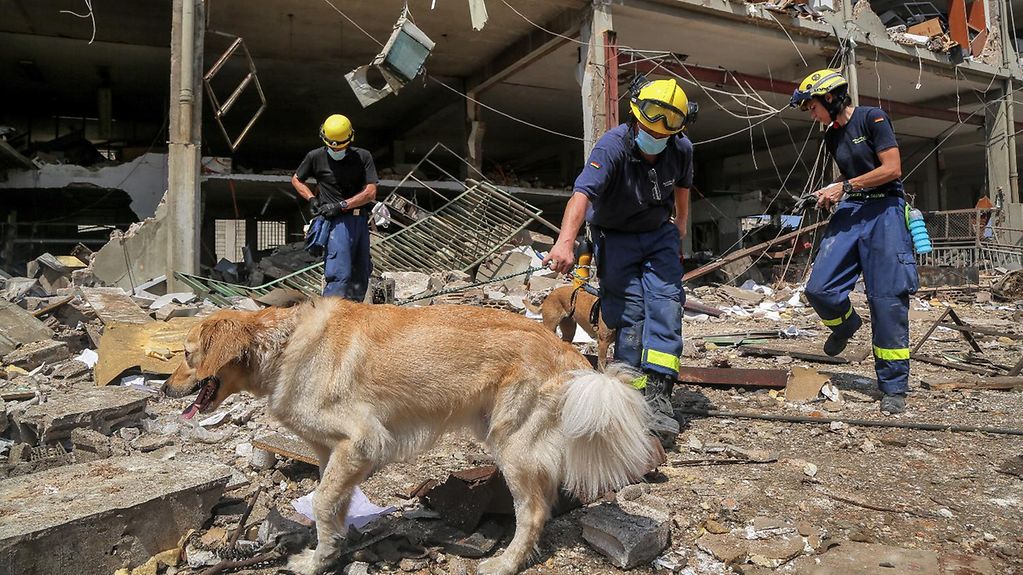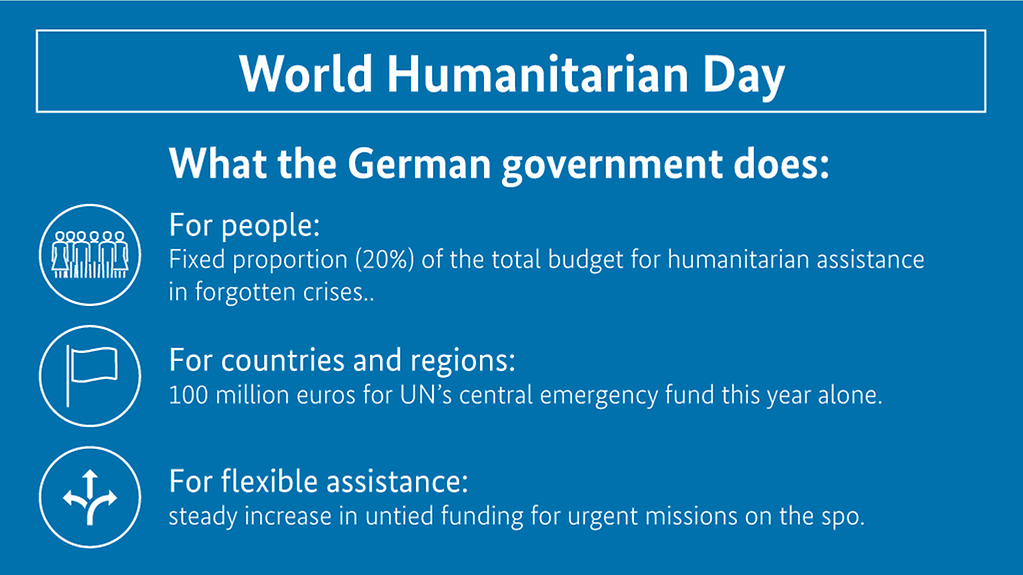World Humanitarian Day
World Humanitarian Day is dedicated to the many people working with enormous commitment and dedication, and often under extremely difficult conditions, to help people in need in many countries around the world. Germany is the world’s second largest donor of humanitarian assistance.
3 min reading time

In Beirut, specialists from the Federal Agency for Technical Relief (THW) have been helping local forces find victims.
Photo: picture alliance/dpa/Maran Naamani
Over 79.5 million people around the world are currently displaced, having been forced to flee by the difficult circumstances in their country or having been expelled from their homes.
In particular where armed conflict rages and state structures are weak, the population often do not have the protection they need. But natural disasters such as earthquakes, the consequences of climate change such as droughts or flooding, or pandemics can also cause massive distress.
Germany provides a great deal of support
With its humanitarian assistance, the German government helps people facing an acute crisis that they cannot weather without support.
The aim is to ensure the immediate survival and safety of people in need, as well as giving them prospects for the future. In crisis- and conflict-affected areas, in particular, where it is difficult to reach people, humanitarian assistance is urgently needed.
As the world’s second largest donor, the German government expects to provide over 2.1 billion euros in humanitarian assistance this year, to help people in need.
Assistance measures for Beirut
The devastating explosions in the Lebanese capital, Beirut, at the start of August plunged hundreds of thousands of people into acute need.

With its humanitarian aid, the German government supports people in acute crises that they cannot weather without assistance.
The diagram shows what the German government does worldwide, to mark World Humanitarian Day:
For people: Fixed proportion (20%) of the total budget for humanitarian assistance in forgotten crises
For countries and regions: 100 million euros for UN’s central emergency fund this year alone
For flexible assistance: steady increase in untied funding for urgent missions on the spot
Photo: Bundesregierung
"I am so happy that we were able to help immediately," stressed the Chancellor in her podcast. "Specialists from the Federal Agency for Technical Relief helped to find people buried under rubble, the Bundeswehr flew in a medical assessment team, while the corvette Ludwigshafen am Rhein set course for Beirut and was ready to provide support."
At an international pledging conference, about 250 million euros were pledged at short notice for Lebanon. Germany is providing 20 million euros to alleviate suffering in Beirut.
Focus on Syria and the region
The situation in Syria and the surrounding region is particularly desperate. Currently, the United Nations is caring for about 11 million people in the area. That is why some 40 per cent of Germany’s assistance is earmarked for Syria and the surrounding countries that have taken in refugees.
A compromise achieved under Germany’s presidency of the United Nations Security Council has at least made it possible to transport urgently needed relief supplies across the border to northern Syria over the months to come.
Humanitarian assistance in Yemen and Africa
In Yemen too, where almost 80 per cent of the population are classed as needy after years of civil war and international isolation, and where over 20 million people face starvation, Germany is actively providing support.
Last year alone, the German government paid in 38 million euros to the humanitarian fund for Yemen.
Africa is another focus of Germany’s support. The Sahel Zone, the Horn of Africa, Sudan, South Sudan and the Great Lakes Region are all areas where Germany provided humanitarian assistance.
Responsibility in the UN Security Council
To ensure that support gets to where it is most urgently needed, a great many courageous and committed helpers are actively involved.
And to ensure that they can do their work even under the most difficult conditions, Germany is working hard within the UN Security Council to ensure that they are protected in line with the principles of international law.
The World Humanitarian Day was launched in 2009 by the United Nations to better coordinate humanitarian assistance at global level.